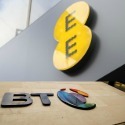UK national operator will have to rip and replace existing infrastructure to meet limitations on Huawei's role in its 5G radio access network rollout and that will set it back £500 million.
January 30, 2020

BT says the limits placed by the British government on Huawei's role in the rollout of 5G and fiber-to-the-premises (FTTP) networks in the UK will result in unplanned changes to its infrastructure that will cost £500 million (US$651 million) over a five-year period.
Earlier this week, the UK government announced limits on the role that Chinese technology supplier Huawei -- deemed a "high risk vendor" by British security experts -- can play in the 5G radio access network (RAN) and FTTP rollouts of the UK's operators: In a nutshell, Huawei will not be allowed to provide equipment at more than 35% of basestation sites nationally across a particular network, or to carry more than 35% of total network traffic volumes.
When it comes to FTTP and other gigabit-capable networks, the Chinese vendor's technology can be used to provide service coverage to no more than 35% of the UK premises covered. These caps must be adhered to within three years of the relevant government legislation coming into force, which is expected soon.
The FTTP cap can be planned for and managed as FTTP rollouts are still at an early stage: BT's semi-autonomous fixed access network unit, Openreach, currently sources its FTTP gear from Huawei and Nokia and is in the process of deciding on a third vendor for its fiber access rollouts, which currently pass 2.2 million UK premises, less than 10% of the UK's total.
However, the cap on the use of Huawei technology in the 5G radio access network is a significant issue for BT, as its 5G rollout is predicated on its 4G RAN infrastructure (inherited from EE, the mobile operator it acquired in 2016) -- where it has Huawei 4G gear, it had planned to deploy Huawei 5G technology for migration, operational and interoperability reasons.
Now, though, because it has so much Huawei 4G gear in its network (deployed in urban areas, where its initial 5G rollouts have been focused), it will have to rip out and replace some of that Chinese technology and replace it with RAN gear from another vendor so that the introduction of 5G will be smooth and meet the new UK government guidelines.
BT's estimate is that the rip-and-replace program will cost it £500 million during the next five years, with much of that cost expected to come in the next three years. In its fiscal third-quarter trading statement today, the UK operator noted:
The new guidance will have some impact on our 5G rollout plans and the equipment used in our FTTP network build going forwards. We are in the process of reviewing the guidance in detail to determine the full impact on our plans. At this time we estimate an impact of around £500 million over the next 5 years.
So which company will benefit from BT's new 5G RAN plans? Well, it already sources RAN gear from Finnish vendor Nokia, which supplies the 4G mobile access equipment deployed outside of dense urban areas. The other option, of course, is Ericsson.
BT is believed to be some way down the line already on evaluating both Nokia and Ericsson's 5G RAN technology: With Huawei's role set to be capped at 35%, it seems unlikely BT will use only one other supplier for the remaining 65%, as that would put too much reliance on one company for a critical part of its next-generation infrastructure, so it seems likely that BT will dual-source to fill out that 65% share, giving it a trio of 5G RAN suppliers.
Of course there is always the prospect that BT will seek to shake up the market and consider a role for suppliers outside the three RAN market leaders: Samsung is desperate to prove itself as a credible fourth supplier, while OpenRAN specialists such as Mavenir and Parallel Wireless would love to get a chance to show their alternative, disaggregated RAN solutions can cut it in a Tier 1 network, but those options seem very unlikely.
News of the unplanned costs, coupled with disappointing fiscal third quarter financials, wiped 6.7% off BT's market value as its share price dropped to 163.5 pence on the London Stock Exchange Thursday morning. (See Eurobites: BT Stock Slumps on Q3 Numbers, Huawei Cap Costs.)
— Ray Le Maistre, Editor-in-Chief, Light Reading
Read more about:
EuropeYou May Also Like









